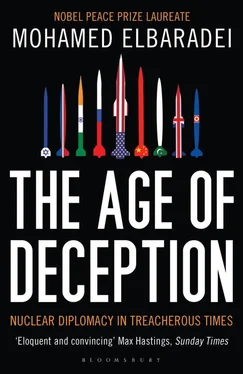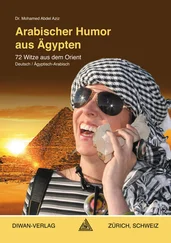In the era of globalization, it is more apparent than ever that these insecurities are threats without borders. We cannot comfort ourselves that a security menace half a world away will not affect us, whether in the form of a cyber attack, a financial meltdown, a pandemic, or a theft of nuclear material. Such threats cannot be countered effectively by any one country or organization; by their nature, they demand cooperative multinational, multidimensional responses.
In the case of nuclear weapons, if the danger is to be mitigated and ultimately eliminated, it must be seen in this broad context. The threat will persist as long as the international community continues to address only the symptoms of each new nuclear proliferation challenge: waging war against one country, making a deal with a second, issuing sanctions in a third, seeking regime change in still another. So long as nuclear weapons remain a security strategy for a limited few possessor countries, with umbrella arrangements that extend that security to a secondary circle of “allied” countries; so long as others are left out in the cold, the proliferation risk will be with us. With the emergence of sophisticated extremist groups, for whom the threat of retaliation is irrelevant, the nuclear deterrent has become no more than a temporary if not delusional security strategy. Security is indivisible.
Fundamentally, this means that the international community needs to develop an alternate system of collective security, one perceived not as a zero-sum game for a given country or group of countries, but as a universal imperative rooted in the notion of human security and solidarity broadly writ. This shift in thinking is not only a moral or ethical obligation, but also one of practical necessity: as the planet’s population grows and resources become more limited, human survival will depend on how effectively we manage our interdependence.
An alternate system of collective security must be, in every respect, equitable and inclusive. We must develop strategies to share the wealth of the planet more equally—recognizing that poverty, too, is a weapon of mass destruction. We must invest deliberately in advanced science and technology to meet development needs, rather than creating products that generate more wealth for the wealthy. Current investments in technology are overwhelmingly profit driven; greater emphasis should be placed on scientific discovery and technological innovation to address hunger and disease. Only when we begin to alleviate poverty will we be able to generate momentum, in affected regions, for effective governance. When basic human needs are met, the environment is conducive for citizens to turn their focus on gaining their political, civil, and social rights.
A multinational security paradigm must rest on strong, responsive multinational institutions. If nothing else, the crises and challenges of nuclear nonproliferation that the IAEA has dealt with in recent years have revealed both the flaws of our existing multinational institutions and the contours of how to fix them. The UN Security Council, the international body charged with keeping world peace, must redirect its attention to the root causes of conflict rather than only the symptoms of insecurity. This would mean far greater emphasis on peacekeeping and peacemaking; on the early identification and prevention of disputes; on agile, effective mediation and reconciliation; and on taking ownership for resolving conflicts. Correspondingly, the council, dominated as it currently is by one or a few members of the P-5, ought to lessen its emphasis on after-the-fact coercive measures, which invariably victimize vulnerable civilians, as occurred in Iraq before the second Gulf War. The council also needs to rebuild its credibility based on consistency and fairness, eliminating the double standards linked to geopolitics or moral relativism.
On the nuclear front especially, the multinational structures for preventing, detecting, and combating proliferation require strengthening. The IAEA, as the de facto custodian of the Nuclear Non-Proliferation Treaty, can be more effective in verifying nuclear programs worldwide—including detecting clandestine nuclear activities—if it is given the necessary authority, technology, funding, and, where applicable, available intelligence and other information.
Legal authority is the first step. A unified effort is needed to bring comprehensive safeguards agreements—and Additional Protocols—into force for all parties to the NPT. This could be completed relatively quickly. The international community must also face up to the limitation of the Agency’s existing verification mandate, centered as it is on nuclear material. If the IAEA is expected to detect and pursue clandestine nuclear weaponization operations, it must have the corresponding legal authority.
To keep up with the pace of technological changes that facilitate nuclear proliferation and to maintain its credibility as an independent verification body, the IAEA must have the necessary financial support to be able to acquire and maintain its own state-of-the-art technological capability and train and renew its inspection workforce. Dollar for dollar, the Agency has proven to be an extraordinarily sound investment. But at its current level of funding and with the dilapidated state of its technology infrastructure, the IAEA sooner or later will be unable to fulfill its nuclear verification mission.
All states should recommit to sharing relevant information with the IAEA about potential nuclear proliferation concerns, consistently and promptly. This is a legal obligation under the NPT. Deception on the part of would-be proliferators cannot be countered effectively if countries with relevant intelligence selectively bypass or support multinational nonproliferation structures according to political whim.
Moreover, when countries with such intelligence deliberately strike first and share information later—in direct contravention of international law, as in Israel’s 2007 bombing of Syria’s facility in Dair Alzour and Iraq’s Osirak research reactor in 1981—condemnation of these actions must follow, and, more important, must come with consequences. The rule of law is meaningless if we apply it only selectively.
Two multinational initiatives already under way should be strengthened. The first is to provide the highest level of security for nuclear and radioactive material, to keep it out of the hands of extremist groups. The second is to move from national to multinational control of the nuclear fuel cycle. In December 2010, the IAEA Board adopted a decision to authorize a fuel bank of low-enriched uranium, under Agency control, to provide an assured supply of fuel to bona fide users—a measure for which I had pressed for years. [1] The vote on this measure passed with twenty-eight in favor. Six countries abstained—Argentina, Brazil, Ecuador, South Africa, Tunisia, and Venezuela—and Pakistan was absent. The abstentions reflect a remaining vestige of distrust about the purpose of the fuel bank, stemming from the early proposal from six Western countries that had asked participants to give up their fuel cycle rights as a condition of fuel supply. Hopefully, this distrust will dissipate over time.
This is an enormously important first step. The ultimate goal, however, should be the full multinationalization of the fuel cycle, in parallel with moving toward universal nuclear disarmament.
From my front-row seat to the nuclear dramas of the past two decades, I have seen over and again how the lack of a sense of fairness and equity in negotiations is guaranteed to sabotage even the most commonsensical, desirable, and just resolutions. The road to win-win bilateral cooperation is strewn with casualties, the victims of disrespect, distrust, self-defeating domestic politics, and painful historical legacies that do not fade overnight.
Читать дальше












